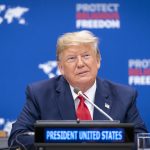British Prime Minister Keir Starmer’s recent phone call with Ukrainian President Volodymyr Zelensky has sparked yet another round of political drama, this time fueled by none other than former President Donald Trump. As Trump boldly expressed concerns over Ukraine’s democratic health—and even labeled Zelensky a dictator—Starmer rushed to affirm Zelensky’s leadership, insisting that suspending democratic processes in times of war is perfectly reasonable. Apparently, Starmer believes that history is on his side, evoking the UK’s suspension of elections during World War II as an example.
In a bid to showcase U.K. solidarity with Ukraine, Starmer’s office made sure to inform the public that the Prime Minister assured Zelensky he is not running a dictatorship. This is rather amusing, considering that martial law in Ukraine has resulted in banned opposition parties and government crackdowns on dissent. John Q. Public might wonder if the support for democracy extends only as far as the artillery shelling does. Starmer’s insistence that suspending elections was a necessary wartime measure feels like he’s dusting off a history textbook and completely ignoring the implications of censorship and silencing dissenting voices.
Trump’s remarks, which stirred up significant outrage across Europe, emphasized the vital importance of giving the Ukrainian populace a voice in their government—even if it appears that voice has been silenced under the guise of martial law. With Trump cautioning Zelensky to act quickly or risk losing his wayward nation, it seems he might be the only one advocating for a more democratic process in a nation fast slipping into quasi-dictatorial rule. It’s particularly rich that criticism of Trump came from European leaders who are more than willing to overlook the ongoing suppression of basic civil liberties in Ukraine.
Starmer’s commendable defense of Zelensky raises eyebrows when one considers that the last national elections in Ukraine were held back in 2019, and the next scheduled ones seem contingent on the eventual end of a war that has yet to show signs of resolution. The Prime Minister seems to hope that comparing Zelensky to Winston Churchill will somehow justify the situation, but the historical context here doesn’t quite fit. After all, Churchill was ultimately ousted from power shortly after the war ended, leaving the question of whether Zelensky’s popularity is as resilient as wartime propaganda suggests.
Sir Keir Starmer spoke to Ukrainian President Zelensky overnight, assuring he is not a dictator and that it was “perfectly reasonable” to suspend democracy because of the Russian invasion. https://t.co/URoUzSZOY5
— Breitbart News (@BreitbartNews) February 20, 2025
Additional complications stem from the undeniable impact of war on political processes. With millions of Ukrainians forced into exile, any polling on public opinion is likely as trustworthy as a political promise in a crowded ballroom. The tragic reality is that martial law has stifled civil liberties, and any attempt to hold elections will face hurdles that would make even Olympic athletes think twice. While Starmer waves the flag of “democracy” in support of his Ukrainian counterpart, the unyielding truth is that genuine democratic governance requires more than just a phone call and some historical comparisons.
As the world watches this messy geopolitical chess game unfurl, one must question what true leadership looks like in a democracy suspended under martial law. The topic is ripe for debate: Is it time for genuine democratic processes to re-emerge in Ukraine, or will those in power cling to their positions until the dust of war settles? As skeptics assess the effectiveness of Ukraine’s current governance, perhaps it’s worth pondering how to strike a balance between supporting a nation in crisis and upholding the democratic values many profess to cherish.




